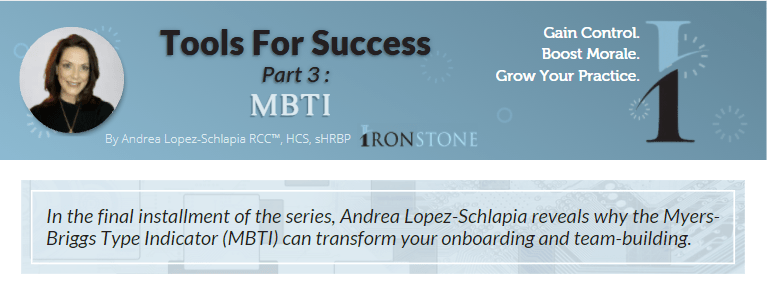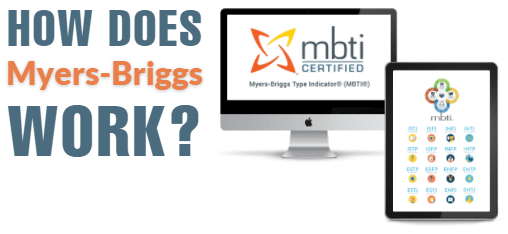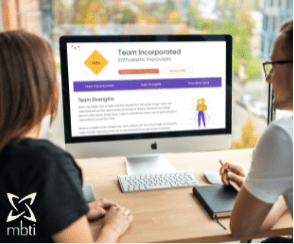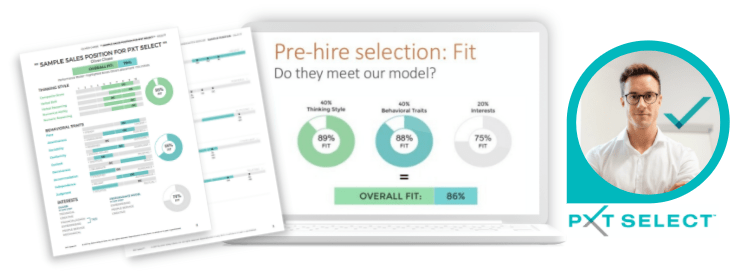
Perhaps the greatest benefit of the Myers-Briggs Type Indicator (MBTI) is that it breeds understanding. If you value diverse opinions in your company, Myers-Briggs can stop you from thinking, “What’s wrong with you?” when you work with someone who processes things differently than you do. Instead, it can inspire you to ask, “Wow, how do you look at things? How do you interpret things?” and to embrace those differences.
It’s like handing your eyeglasses to somebody: You let them see the world through your lens, rather than their own. Imagine the possibilities you can unleash if you say, “Let me look at the same situation through your lens so I can understand how you perceive it.” If two employees stood back to back, it would give each of them a 360-degree view of the situation! It’s what you want teams to do – and it explains why the Human Element of the Fundamental 4™ is the leading reason clients contact Ironstone initially.


MBTI results are categorized by 16 different types. The questions on the MBTI assessment are designed to reveal your natural preferences by measuring them in terms of four pairs of opposites:

Extroversion and Introversion = your energy source
Sensing and Intuition = your information intake
Thinking and Feeling = your decision-making process
Judging and Perceiving = your lifestyle, how you approach the world
For instance, my MBTI assessment “types” me as an “ESFJ.” According to theories developed by legendary Swiss psychiatrist and psychoanalyst Carl Jung, “ESFJ” stands for “Extrovert Sensing Feeling Judging,” which represents my preferences among the 16 different personality types.
So, what does that actually mean? Like my fellow ESFJs, I am energized by spending time with others (Extrovert), I focus on facts and details (Sensing), I make decisions based on feelings and values (Feeling), and I prefer planned, organized lifestyles (Judging).
On the other hand, my co-worker could be an INTP (Introverted, iNtuitive, Thinking, Perceiving), which is my complete opposite.
Based on the results of an individual’s MBTI assessment – during onboarding and beyond – the Ironstone team can help you interpret the dichotomies of your employees and measure how they will (or, in some cases, won’t) work together.
A successful office culture respects the preferences of someone who’s energized by being around their team members and someone who works better alone. Neither type is right or wrong, just different. In fact, years ago I attended a workshop where a person summed up the introvert-extrovert dichotomy perfectly: “Introverts are not party poopers. They are merely pooped by the party.”

As I noted in Part One of this series, Myers-Briggs insights can make onboarding a new hire run a lot smoother. The worst onboarding experience you can give someone is saying, “Here’s your desk, computer, and phone. Good luck!”
At Ironstone, we help advisors hire people who are the right fit using due diligence and tools like PXT Select™. From there, we combine that “intel” with Myers-Briggs results to provide structure for the onboarding process: “You’re going to sit in the Admin chair. Then the Client Service chair. Then the Advisor chair,” etc., depending on the employee’s role. Again, it’s about wearing different lenses to deepen understanding.

Does all this testing really work? In my experience, assessment tools are 99.9% valid in predicting the success of a team. I liken it to being left-handed or right-handed. If you are left-handed, does that mean you can’t put the pen in the other hand and sign your signature? No, it just takes more effort. You have to think about how to hold the pen and turn the paper a certain way. Similarly, if testing helps you understand how your employees are “wired,” it also helps your employees value the unique strengths each team member offers. In the end, this awareness can bring your practice one step closer to operating at its highest and best level.
![]()